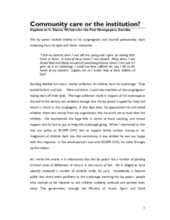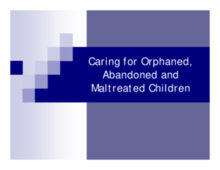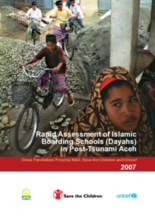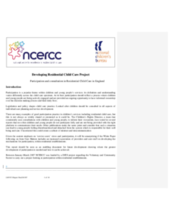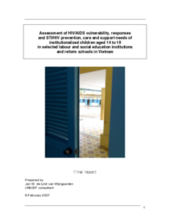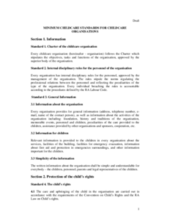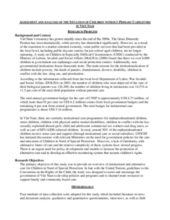Displaying 1351 - 1360 of 1465
Brief article observing the proliferation of orphanages in Zambia. Points to several models of community-based care as alternatives better able to address the rights and needs of children.
A powerpoint presentation on the research findings of the Bucharest Early Intervention Project team. Includes comparisons of children raised in institutional care, vs. children placed in foster care, vs. children raised in the community.
This paper presents a study on the children who were sent to orphanages or Islamic boarding schools (Dayahs) in Indonesia in the aftermath of the 2004 Boxing Day Tsunami.
This project aimed to bring together the available information on the number of disabled people living in residential institutions in 28 European countries, and to identify successful strategies for replacing institutions with community-based services, paying particular attention to economic issues in the transition. It is the largest study of its kind. This project was funded in order to identify as a priority the practical considerations of how to support states making the transition to community-based services, including managing the costs of doing so.
This report aims to provide insight into children’s perceptions of participation within England’s residential care system, and to note any potential or perceived barriers to participation.
A study of the management, operations, and care offered by institutions for AIDS orphans in South Africa. It compares the findings of registered and unregistered institutions.
Qualitatively assesses the vulnerability of children living in institutional care in Vietnam. Includes specific recommendations for systems strengthening to reduce vulnerability in various institutional contexts.
This video by Save the Children highlights key research findings from an assessment on the quality of care in children's homes in Indonesia (2007), jointly published with the Indonesian Ministry of Social Affairs and UNICEF.
Guidelines for the minimum standards for residential childcare institutions in Armenia, including how the child should be received, cared for, and the arrangements for the child leaving the institution.
Overview of institutional and alternative care for Children in Need of Special Protection in Vietnam

